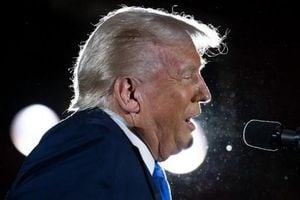When conservative activist Charlie Kirk was fatally shot during a speaking engagement at Utah Valley University on September 10, 2025, the reverberations were felt far beyond political circles. Kirk, just 31 and already a co-founder of Turning Point USA, was a controversial figure admired by many on the right and reviled by some on the left. But in the days that followed his death, it was the words of actor and activist Sean Penn—no stranger to political controversy himself—that sparked a new round of debate about the state of civil discourse and violence in American politics.
In a series of interviews with major outlets including The New York Times and Vanity Fair, Penn made it clear that he disagreed with almost everything Kirk believed. Yet, he also argued passionately that people like Kirk are essential for a healthy democracy. "We need that debate," Penn told The New York Times in an interview published September 27, 2025. "We’ve gotta fight it out and find a compromise. [Acts of political violence] do come into fashion, and the way we kill the fashion of it is people of conscience on both sides recognizing that if somebody really believes something, that’s your friend."
It’s a striking statement from someone who has built a reputation as a fierce critic of right-wing politics—especially the Trump administration, which Penn once described as "obscene." But Penn’s comments, delivered just days after Kirk’s assassination, cut through the usual partisan noise. He insisted that deeply held beliefs, even those we find objectionable, must be recognized as valid opinions if society is to move forward. "I’m talking about if somebody believes that a human being starts at conception, if you can’t understand that concept, you’re just stupid. And if you’re not willing to tolerate the concept as a concept that’s held as deeply as I may have a belief that, I don’t know, let the woman decide. All of these are valid opinions," Penn explained to The New York Times.
For Penn, Kirk’s death was fundamentally different from other high-profile killings that have rocked the nation in recent years. He contrasted it with the deaths of UnitedHealthcare CEO Brian Thompson and Minnesota House Speaker Emerita Melissa Hortman and her husband, noting, "These fashions of violence; this one seems different. It seems different than the members of Congress. It seems different than the insurance executive. It seems even different than the attempt on the president. There’s something about this one."
The actor’s perspective is shaped not just by his activism, but also by his recent role as a ruthless white supremacist in Paul Thomas Anderson’s film One Battle After Another, which premiered in theaters on September 26, 2025. The film, which follows a group of ex-revolutionaries, has gained cultural relevance as political tensions in the U.S. continue to escalate. Penn acknowledged the uncomfortable parallels between art and reality, telling Vanity Fair that he was "not surprised at all" by Kirk’s murder. "Like a lot of people, I’ve been worrying that this kind of horror was moving towards coming into fashion. It’s disturbing enough that I would say I’m still processing it. And what its implications are."
The shooting, which occurred just 24 hours before Penn’s Vanity Fair interview, was carried out by 22-year-old Tyler Robinson, who has since been charged with murder. According to NBC News, federal investigators found no evidence connecting Robinson to left-wing groups, despite claims from some right-wing figures—including former President Donald Trump—that Kirk’s death was the result of a broader leftist conspiracy. "Every indication so far is that this was one guy who did one really bad thing because he found Kirk’s ideology personally offensive," a source told NBC News.
Kirk’s death prompted an outpouring of grief and outrage across the political spectrum. At his public memorial service in Glendale, Arizona, on September 15, 2025, Kirk’s widow publicly forgave her husband’s killer in front of tens of thousands of mourners. The event, however, was not without political controversy. President Trump, who announced Kirk’s death on Truth Social, used his speech to blame the "radical left" and threatened to target liberal organizations he believed were maligning or celebrating Kirk’s death. Trump wrote, "The Great, and even Legendary, Charlie Kirk, is dead. No one understood or had the Heart of the Youth in the United States of America better than Charlie. He was loved and admired by ALL, especially me, and now, he is no longer with us. Melania and my Sympathies go out to his beautiful wife Erika, and family. Charlie, we love you!"
Hollywood, too, weighed in. Stars such as Stephen Colbert, Whoopi Goldberg, Jamie Lee Curtis, Michael Keaton, Arnold Schwarzenegger, and Amanda Seyfried all shared their thoughts in the weeks following Kirk’s death, underscoring the national magnitude of the event.
Penn’s call for compromise and open debate has not gone unchallenged. Some critics argue that there are limits to what should be considered a "valid opinion," especially when it comes to hate speech or rhetoric that incites violence. As FandomWire pointed out, "Hate speech that incites harm against certain communities under the guise of freedom of expression shouldn’t be given the same recognition and platform. Since giving them that platform could potentially lead to hateful conduct being normalized." Even Penn himself acknowledged the complexity, stating, "I’m not talking about some sociopathic Nazism. I’m talking about… valid opinions."
Still, Penn’s underlying message is one of hope for a less polarized and violent society. He’s not asking anyone to abandon their beliefs, but rather to recognize the humanity in those with whom they disagree. "If somebody really believes something, that’s your friend," he said, emphasizing the need to "fight it out and find a compromise."
For a nation grappling with the fallout of yet another act of political violence, Penn’s words serve as both a challenge and a reminder: the path forward isn’t through silencing opponents, but through engaging them—however difficult that may be. As the dust settles on the tragedy of Charlie Kirk’s death, the conversation about how to bridge America’s divides is far from over. But perhaps, as Penn suggests, it’s a debate worth having—again and again—until something finally gives.






